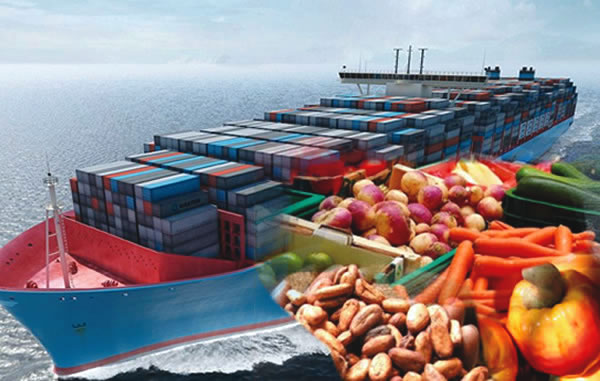
With hundreds of kilometers of arable land from mangrove to the Savanna, agriculture can become the major source of foreign exchange for Nigeria
Nigeria is sitting on huge wealth that it is almost slipping away. That wealth is agriculture, which has remained untapped as a huge source of foreign exchange because government has not shown great commitment to developing the agriculture sector to produce food for local use and for export.
Beyond technicalities and policies, the sure way Nigeria can improve the value of the naira and have trade balance or advantage is to export more farm produce. Nigeria’s potential to do this is very high, but Nigeria is yet to have intentional and committed approach to leveraging the opportunities provided by the country’s fertile soil.
Nigeria is world’s highest producer of cassava, yet, it has not dominated the cassava export market. Nigeria has the potential to be the highest cocoa producer in the world, but it has no laid plans to encourage farmers to produce more cocoa. Nigeria can produce the highest volume of palm oil and should be the number one exporter of palm in the world, but today, Nigeria is importing palm oil for domestic use.
The major problem of Nigeria is that it has not articulated implementable policies on how it can boost export of agricultural produce because it is fixated with oil and gas.
These were the views of stakeholders who converged recently at the cargo terminal of the Murtala Muhammed International Airport, Lagos to unveil a N1 billion Export Processing and Packaging Centre built by the Nigerian Aviation Handling Company (NAHCO) Plc.
The facility would enhance the preservation of farm produce, modernise packaging of perishables in accordance with international standards and also facilitate urgent freighting of the goods to the global markets.
Traceability
One of the major obstacles Nigeria has in exporting its farm produce is traceability. In most global markets, one of the critical factors they consider is the provenance of the farm that supplied the produce. Where is it coming from? They also want to know how the crop is produced, the chemicals or additives used in producing it. This is to ensure that the produce is safe for human consumption. By building the processing centre, what NAHCO has done now is to provide the origin of the farm produce emanating from its facility. This is described as a major move, which would help Nigerian farmers to use the platform provided by NAHCO to export its farm produce.
Nigeria can export farm produce such as sorghum, millets, maize, soybeans, beans, groundnuts, and cashew nuts. In addition to tigernuts, cassia tora, grains of paradise, or bambara groundnut. Nigeria has perishable farm produce that can only be freighted by air and these include vegetables, special pepper, known as Nsukka pepper, bananas, plantain and many others.
International vs Local Markets
Another challenge Nigeria is facing is its failure to meet the demand of the local market while exporting some of its farm produce. The consequence is the scarcity and high cost of the produce locally. Take for example, bitter kola, this is in high demand in Nigeria but many explained that it is now scarce and costly because it is being exported. The magic to it is to increase the farming of such produce, knowing that it is in high demand both locally and in the international market.
According to the Nigeria Bureau of Statistics, the Nigeria’s agricultural exports surged to a five-year high in 2022 amid local production push. A total of N598.2 billion worth of agricultural produce were exported in 2022, accounting for 18.5 percent increase when compared to 2021. There has been greater determination to boost agricultural exports but some government policies seem to impinge on these efforts.
Recently Ekalavya Kumar, a process technologist at Buhler Nigeria (which manufactures food processing equipment) said there should be meeting points where the need to generate revenue from exports, boost GDP and be able to feed the country, will occur in perfect synergy. Just as export is important, if the nation’s consumption is not met, the job remains undone. A multipronged approach becomes essential to boost productivity, enhance value and invariably, what is earned from exports of final produce, without sacrificing local food security.
In other words, while boosting export of farm produce, Nigeria should also think of the local consumption and produce enough for the country and for export and by its arable land, Nigeria has the opportunity to produce enough food for its teeming population and for export.
THISDAY learnt that in 2022 cocoa beans, sesame seeds, and cashew nuts topped the list of exported agricultural commodities, earning Nigeria about N442.95 billion. Cocoa alone stood at N232.65 billion, accounting for 38.89 percent of total agricultural exports. Sesame seeds export was valued at N139.85 billion, accounting for 23.34 percent of total agric exports within the period, while cashew nuts in shells valued at N70.45 billion were exported.
Alternative to Oil
The Secretary of the National Committee on the African Continental Free Trade Area (AfCFTA) and former Chief Executive Officer of the Nigerian Export Promotion Council (NEPC), Mr. Segun Awolowo, said agriculture should be the mainstay of Nigeria’s economy instead of oil, insisting that if fully exploited Nigeria could generate $30 billion from farm produce. He spoke at the sidelines during the unveiling of NAHCO’s Export Processing and Packaging Centre in Lagos.
“This is what I’ve been preaching for over eight years now. And I came up with what I call the Zero Oil Plan. That Nigeria must survive in a world economy where she no longer sells oil. At that time, it sounded very audacious and we are seeing it now.
“What is happening with oil and climate change, renewables are coming up. Many countries are not going to be using petrol again, it is all electric now. So how does Nigeria play in it?We must grow. Our key strength is our growth, we must grow more and produce more and then export. Because if our economy is not exporting, we will continue to have these challenges. Other countries that have made it big have been exporting.That is what has been driving those economies. The same can happen for Nigeria, a country that is as blessed as this. So we have no other choice but to do this (establishing the processing centre). It is fascinating what we are launching today, it is also one of the steps towards that, where we can preserve the process package and then put it on. This is air freight, so in the next six hours, it gets to where it is going.So, that is advantage of it. So many exporters can now grow because they know they have a facility that can process their exports. This is the step in the right direction,” he said.
Awolowo said export of farm produce could earn Nigeria about $30 billion if fully galvanized; if the country produces more and export more.
“We had a shortfall in our economy of some 30 billion dollars when oil prices dropped and we calculated this on 22 products, we can make that money back. That was five years ago. You can imagine it now. But Nigeria must produce more. We must ramp up production and productivity and that is the only way we can survive. We are also looking at the African continent free trade area, it is another thing we have to be very, very particular about. Because if we don’t get it, other countries will take advantage of us,” he said.
Non-oil Export as Elixir
The Group Managing Director and Chief Executive Officer of NAHCO, Mr. Indranil Gupta, said non-oil exports are very critical for Nigeria’s economy; so, the country should make efforts to encourage farming and also use policies and their implementation to ensure that all the hindrances to export of farm produce and other products are enhanced.
“It is important for me to emphasise that export will play a pivotal role in strengthening the economic might of our great nation. Exporting goes beyond sending goods outside our borders as all of us define it to be. Exports bring about economic development by way of earning Forex and it also helps the domestic economy by generating jobs, thereby putting money into the pockets of our countrymen. Moreover, exports have the potential of impacting a nations image, as a nation gets to be known by the products they export. Biggest example of this phenomenon is China. It is also a strategic action that propels our country towards prosperity. By tapping into global markets, we open doors to new opportunities, create jobs, and foster economic development,” said.
The Group Managing Director also said that Nigerians inDiaspora are playing a pivotal role in popularisingNigerian’s agricultural produce globally, noting that proper processing and packaging facilities are crucial to the endeavor of taking those products to them. He added that Nigerian farm produce has gained popularity in some international markets due to, among other things, the growing migration of Nigerians to such destinations.
Better Packaging
He remarked that while there is tremendous potential for air freight in transportation of perishables, there is an increasing need for Nigeria to invest in better packaging facilities that meet global standards.
“This our Export Processing and Packaging Centre is our contribution towards major response to meet this need as a nation.Our new facility is a strategic move to enhance the competitiveness of Nigerian products on the global stage, create jobs at home and push the boundaries of what Nigeria could sell abroad.
“By streamlining our export processes, adhering to stringent packaging standards, and ensuring the quality of our products, we not only bolster the reputation of Nigerian goods but also contribute significantly to how Nigeria’s products are viewed outside our shores. And this is very important.Additionally, the Export Processing and Packaging Centre will foster skills development and empower our youths as it expands operations. Thus, the centre is not all about business for NAHCO; it is also about our commitment to the socio-economic empowerment of our people,” Gupta said.
High Cost of Nigerian Produce
The Managing Director of ABX World, a cargo export company, Captain John Okakpu, said high cost of exporting Nigerian farm produce makes the prices of such produce in the international market unaffordable because other countries that export similar produce sell theirs cheaper. He lamented that there are too many checks on Nigerian goods by agencies such as Quarantine, Customs, NDLEA, NAFDAC and others while passing through processing for export. He urged the Federal Government to remove bureaucratic bottlenecks that constitute impediment to export of Nigerian good. He called for the streamlining of agencies that inspect goods before they are exported because passing through these agencies will cause delay and agro produce such as perishables would lose their freshness by the time they got to their destination.
“For example, almost 90 per cent of ose Nsukka (yellow pepper) sold in Europe comes from Uganda and some from Cameroon. The Nsukka yellow pepper is much better than the ones from Uganda. Flight from Uganda to Europe is two hours longer than flying from Nigeria to Europe. The irony of it is that Uganda pepper with more flight time is far much cheaper than that of Nigeria in Europe,” Okakpu said.
For Nigeria to maximise the export of its farm produce, it must encourage the farmers, remove impediments to export and reduce charges levied on their goods.






